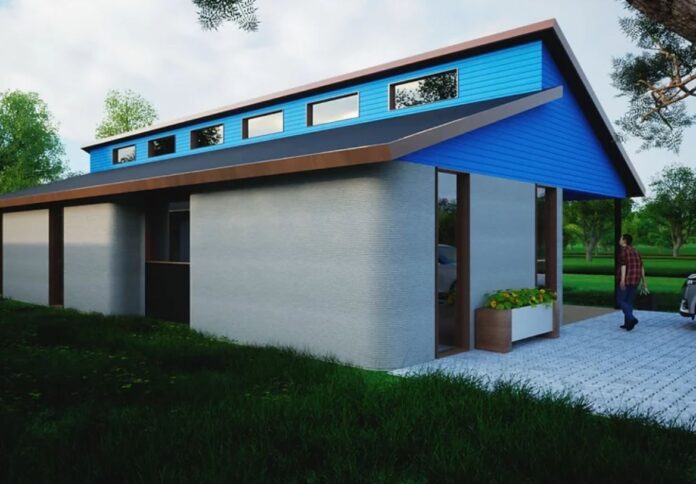
Media Release
Cutting-edge Australian 3D printing building and construction company, Luyten, has launched the world’s largest mobile 3D smart AI-powered concrete printer for the building and construction industry.
Aptly titled, the Platypus X12, to reflect its Australian design and tech heritage, the printer is already being hailed a global success story as construction firms across the world place orders to accelerate build schedules and revolutionise delivery capabilities.
The newly launched printer is the first of its kind in Australia, the southern hemisphere and the largest worldwide. The Luyten Platypus series is the world’s leading range of 3D concrete printers and the ultimate field and factory-ready printing system for high-quality finished products and architectural designs that demand something more.
According to Ahmed Mahil, cofounder and CEO of Luyten, the all-new Luyten Platypus X12 is built with high mobility and accuracy in mind and is big enough to build large-scale structures in one go.
“It is the most sophisticated mobile 3D concrete printer in the world. In designing the printer, we focused on cutting-edge tech and useability to ensure the printer delivered the most elaborate and precise results possible while also providing the most user-friendly experience possible,” Mahil said.
“The Platypus X12 includes a proprietary Luyten Tursiops extruder with an optional 3D-compliant contour nozzle. It also includes optional off-rail operations mode using sensor fusion technology coupled with robust AI algorithms for expeditionary use cases.
“Flexible in scale, the printer can transform in size to a 12 x 6 mobile crane in 20 minutes, expanding its capability to print large-scale structures. It literally extends to 12-metres in width, 6-metres in height and thanks to its robotic nature only takes a few minutes to unfold to complete size.
“Despite its size and robotic ability to extend and to any size, it is also very light, yet robust and mobile. The printer is unmatched internationally thanks to its capacity to incorporate acoustic and optical-based artificial intelligence for data-driven concrete printing. It also has a patented anti-clogging printer head, which means that the technology can produce state-of-the-art results time after time.”
Since launching in 2020, Luyten has continued to announce significant milestones including the build of the first-ever 3D printed house in the southern hemisphere in Melbourne, Victoria in 2021.
The house, called the ‘Heptapod’, is Australia and New Zealand building code (AS/NSZ 1170) compliant and was built using Luyten’s highly robust and eco-friendly Ultimatecrete 3D printable concrete which results in 82.5 MPa compressive strength after 28 days, four times stronger than the 20 MPa residential building code requires.
“The Heptapod elements were printed in two days and assembled on day three. Printed elements were ready to handle and be moved within only five hours of being printed. This is the great thing about our special concrete mix, it cures quickly and delivers results that supersede what is currently available at four times less cost. In fact, the build cost was 70 per cent less in comparison to traditional methods,” Mahil said.
In the same year, Luyten also signed an MOU with the University of NSW to develop 3D printing capabilities for structures and base camps on the moon and other planets.
In August 2022 Luyten printed the ‘Warle Akweke’, the first ever 3D printed house in situ using the largest 3D concrete printer in Australia and the southern hemisphere in an uncontrolled environment (outdoors conditions). This is the first 3D-printed indigenous housing project in the world.
In addition, Luyten has just signed a new partnership with RMIT to provide a 3D concrete printer for the Centre for Innovation Structures and Materials (CISM).
Luyten is focused on bridging the technological gap in large-scale and manufacturing industries through the introduction of robust construction automation technologies such as cutting-edge 3D printing and additive technologies. The company designs and manufactures custom large-scale three-dimensional construction printers for domestic and commercial construction.
Since launching, Luyten’s mission has been to make construction easier and more sustainable across a broad range of industries by reducing the time and cost to build, the amount of construction waste generated, and the impact of build activities on the surrounding environment.
Luyten’s cutting-edge 3D printing and additive technologies have become a worldwide success story as companies across the globe scramble to purchase its printers.
“Luyten transforms construction projects that traditionally take months or years to complete and finishes them within a number of days. The 3D concrete printing revolutionary technology reduces 60 per cent of construction waste, 70 per cent of production time, and 80 per cent of labour costs when comparing hands-on construction projects,” Mahil explained.
“In addition, the technology is proven to increase construction site efficiency with 60 per cent guaranteed costs savings, 300 to 500 times shorter execution times, and an 80 per cent total reduction in monetary expenses without formwork in concrete construction. The world has never seen capabilities like this before.
“When forming Luyten, we were cognisant of the construction industry’s carbon footprint and determined to create construction solutions for generations to come that reduce emissions. Our unmatched technology employs up to 40 per cent less carbon dioxide emissions through propriety mixes that reduce use of cement, and the robotic systems reduce construction site and logistics carbon dioxide footprints by 50 to 70 per cent.”




















